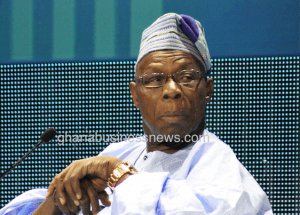Obasanjo calls for coal plants in Africa to address energy deficit

Former Nigerian President, Olusegun Obasanjo seems to have touched on a touchy matter when he defended the need for Africa to use coal to provide electricity for its 600 million citizens who are living without power.
“I am an environmentalist, but I wouldn’t mind to dirty the environment so I can provide power for the people,” he said. Adding, “Let’s use what we have. We have coal in Africa, let’s use it, when we pollute the environment a little, we will all clean it up,” he said.
He argued that without coal, Europe wouldn’t have experienced the industrial revolution.
Obasanjo was making contributions at the roundtable on the topic; Africa’s Energy: What’s the New Deal? At the ongoing 51st Annual Meetings of the African Development Bank (AfDB) in Lusaka Zambia, Wednesday May 25, 2016.
At the beginning of 2016, over 645 million Africans – some two-thirds of the people on the continent – had no access to energy, and unless something is done about the situation, this would continue till 2030, over 750 million Africans do not have clean energy for cooking.
While there are calls for investments in renewable energy solutions, coal isn’t on the agenda. Emphasis has been on solar, wind, and geothermal.
Even though coal might appear cheaper as a source of energy, its long term cost is higher. For instance it is known that compared to natural gas, the price of coal for electric power plants in the United States has remained relatively stable since the 1980s and expected to remain so over the next 25 years.
Coal-fired energy plants might also look attractive, but coal is not clean energy. As pointed out by environmental journalist and author, Joshua Frank in the case of the United States “coal-fired power plants in the US produce approximately 140 million tons of fly ash, scrubber sludge, and additional combustion waste.”
Coal has environmental and health implications and for African countries, which are already overwhelmed by environmental challenges.
On July 9, 2013 the BBC carried a report on the use of coal in China and the effect on human health and life.
The BBC reported that a study published in the Proceedings of the National Academy of Sciences, found that China’s policy of giving free coal for heating to residents in the north has contributed to shaving 5.5 years off life expectancy there.
According to the study, air pollution from burning coal in the area north of the Huai River, with a population of some 500 million people, was 55 per cent higher than in the south.
The region also had higher rates of heart and lung disease as a result of the policy in force up to 1980.
The study was conducted by researchers from China, the US and Israel, the report indicated.
Impact of coal on climate change
The US, China and India are the world’s top producers and consumers of coal, according to available information. Coal supplies 26.6 percent of energy worldwide, and its use is reported to be responsible for 43.1 percent of global CO2 emissions. CO2 or carbon dioxide emissions are responsible for climate change.
Meanwhile, it should be noted that African economies are heavily dependent on climate sensitive sectors such as agriculture, fisheries, tourism and the forest sector.
A study by the University of California, Berkeley says, “Rainfall in the Sahel has dropped 20-30 percent in the 20th century, the world’s most severe long-term drought since measurements from rainfall gauges began in the mid-1800s.”
There is also the phenomenon of desertification, a feature of climate change, which is having devastating effects on African economies.
The AfDB has said it will lead the way on green growth and triple its climate finance in Africa to $5 billion per year by 2020.
Speaking at the opening of the 51st Annual Meetings of the AfDB, his first as president of the Africa focused multilateral, Dr. Akinwumi Adesina denounced the situation and laid out the Bank’s strategy to address both the climate change challenges of the continent and lack of electricity.
He also noted the devastating effects of El Nino on African countries, indicating that the Bank is providing financing of $549 million to support countries to deal with drought and reduce vulnerability.
He said the AfDB would invest $12 billion in the energy sector over the next five years to deliver on the New Deal on Energy for Africa – the Bank’s strategy.
“We expect to leverage $45-50 billion into the energy sector,” he added.
By Emmanuel K. Dogbevi, in Lusaka, Zambia
Copyright © 2016 by Creative Imaginations Publicity
All rights reserved. This article or any portion thereof may not be reproduced or used in any manner whatsoever without the express written permission of the publisher except for the use of brief quotations in reviews.
